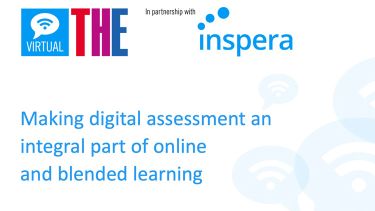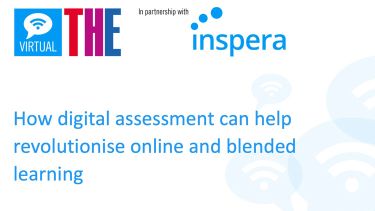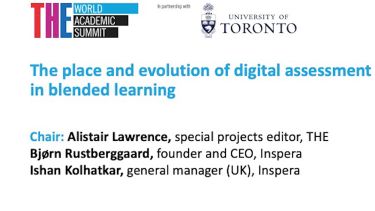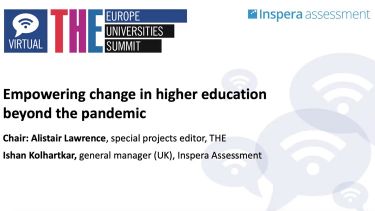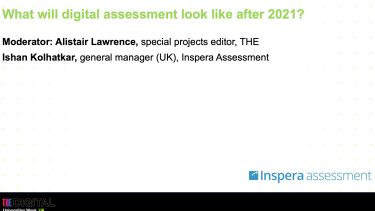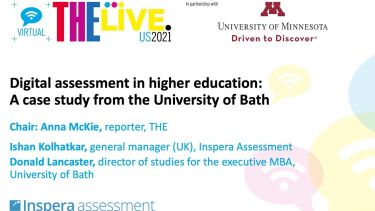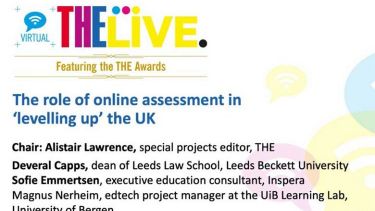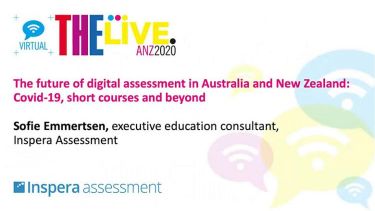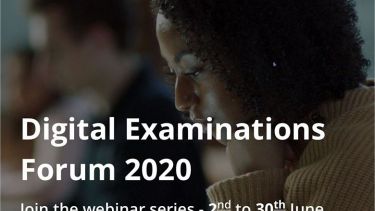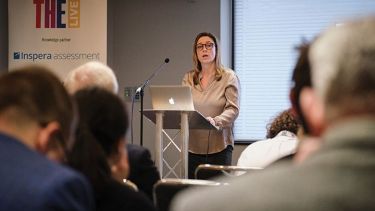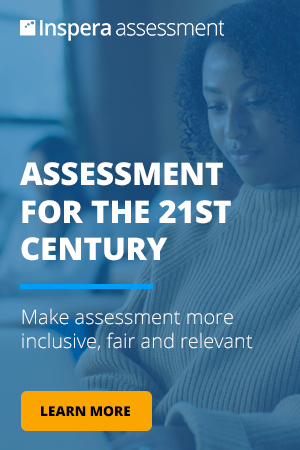Universities have had almost two years to get to grips with blending online and face-to-face learning. But where does digital assessment fit into their offering?
The University of Central Oklahoma describes its approach to blended learning during the pandemic as an “extended classroom model”, where some students attend classes face-to-face, and others attend synchronously via digital platforms. Jeff King, executive director of the Centre for Excellence in Transformative Teaching and Learning at the university, said this was just one aspect of its “pandemic pivot”.
“Faculty members who were mostly functioning face-to-face were the ones who had the most difficulty making the transition,” King said at a webinar on positioning digital assessment, held by Times Higher Education in association with Inspera Assessment. Those teaching fully online had a better understanding of engaging students in assessment in an asynchronous environment, he added.
There was a realisation that more formative assessment would support students in their “new normal”, so support for faculty in this area was a priority. “We could take existing resources and customise them for an environment where staff might not be able to give feedback in the same way as they would in a face-to-face environment,” King explained.
Ismail Fayed, director of educational technology at Yorkville University, felt the pandemic helped faculty embrace new approaches. “We have more resilience in teaching and assessments. The whole university has been forced to adapt to change in a very short time,” Fayed said.
Faculty have been implementing tools that were less popular before the pandemic, such as providing regular video feedback or awarding microcredentials, as opposed to just using summative assessments.
Working out the best approach to online assessment can depend on discipline and institution, said Ishan Kolhatkar, UK general manager at Inspera Assessment. Some professional qualifications have implications for students’ careers so need to meet the requirements of regulatory or statutory bodies, for example. “Virtual learning environments [VLEs] can do some assessment, but the benefits of using a dedicated assessment platform is you get the blend,” he explained. “A VLE might let you do a quick quiz before a class tomorrow, but high stakes assessment would need the right tool for the right purpose.”
Embracing innovation in assessment can help universities improve the student experience, added Kolhatkar. King said one of the silver linings of the pandemic had been staff’s readiness to try out new tools within their learning management system or use familiar tools such as Zoom or Microsoft Teams to create a more authentic assessment.
“In a virtual environment, we’re looking for ways you can get more direct types of assessment, so you can get a picture of what a student can or can’t do,” King said. This has had positive outcomes for diversity and inclusion, he added, because learners “have the opportunity to show what they have learned and an opportunity to fail in a safe space”. A student with poor written English, for example, might be better able to convey their knowledge via a video interview than a formal written test.
Overcoming students’ concerns around online proctoring is another challenge. “When you’re doing an online test then proctoring has to be applied, and students need to agree to those procedures. If not, the institution has to apply alternatives such as asking the student to sit the test on campus,” Fayed said. Finally, he urged institutions to consider the design of the test itself so it can be used without extra coding or third-party apps to guarantee broad accessibility.
The panel:
- Ismail Fayed, director of educational technology, Yorkville University
- Jeff King, executive director of the Centre for Excellence in Transformative Teaching and Learning, University of Central Oklahoma
- Ishan Kolhatkar, UK general manager, Inspera Assessment
- Ashton Wenborn, special projects deputy editor, Times Higher Education (chair)
Watch the webinar on demand above or on the THE Connect YouTube channel.
Find out more about Inspera.



